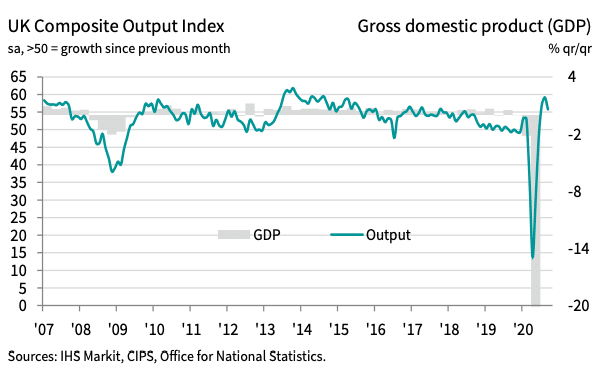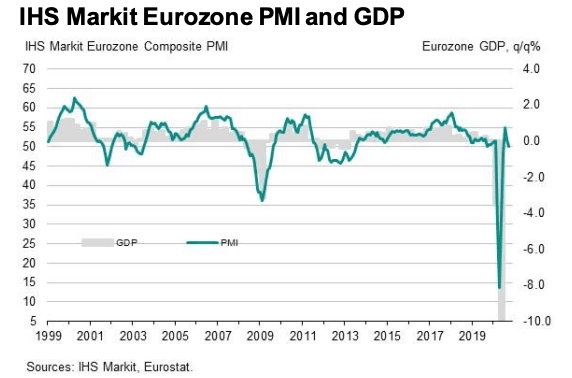UK Economic Rebound Slows in September, PMI Survey Shows Outlook Laden with Gloom
- Economic recovery continues, but seen slowing
- Further covid restrictions could set back recovery by a year
- "Businesses remained gloomy about future plans"

Image © Adobe Stock
A survey of the UK economy covering the September period showed the rebound continues apace, even if it had slowed since August and was a little softer than market consensus had been expecting.
The IHS Markit flash PMI for manufacturing read at 54.3 which was down on August's reading of 55.2 but did beat expectations for a reading of 54.1. The PMI for the services sector read at 55.1, which is below August's 58.8 and just below the consensus forecast for a reading of 56.0.
"The fall in the services PMI was probably in part due to the expiry of the government’s Eat Out to Help Out restaurant discount scheme," says Thomas Pugh, UK Economist at Capital Economics.
The composite PMI which weighs the two sectors according to their share of the economy read at 55.7, below August's 59.1 and the consensus expectation for 56.3.
IHS Markit said in a statement that the September data pointed to a setback for the recovery in UK private sector output, with the rate of expansion easing from August's 72-month high.
The slowdown reflected weaker rises in both manufacturing production and service sector activity.
UK private sector companies also pointed to another drop in business expectations for the year ahead, with the degree of optimism falling to its lowest since May.
"The effects of covid restrictions continued to suffocate the UK economy this month as some of the recent gains in the manufacturing and services sectors were lost, and supply chains continued to suffer bouts of instability with stock shortages and longer delivery times," says Duncan Brock, Group Director at CIPS, who sponsor the report.
The report revealed the volumes of new business booked by UK firms increased at the weakest pace for three months in September.
Reports from survey respondents highlighted concerns that the speed of recovery in customer demand had already peaked, with subdued economic conditions at home and abroad acting as a brake on new project starts.
"Businesses remained gloomy about future plans and turned instead towards shedding jobs at a distressing rate especially amongst those reliant on consumer footfall," says Brock.
Employment numbers continued to decrease "at a sharp pace" in September, although the report shows the latest reduction was the least marked since March.
Economists are concerned that the reimposition of restrictions by the government on Tuesday aimed at halting the growing spread of covid-19 will stall the economic recovery further.
"Reinstating restrictions on business opening hours and encouraging people to work from home again could cause the recovery to stall completely in Q4," says Pugh. "It now seems likely that the UK restrictions will set back the economic recovery and cause GDP to stagnate in Q4. But the big risk is that the government has to go further. For example, a two-week national lockdown could reduce the level of GDP by 5% and set back the economic recovery by a year."
Eurozone PMIs were also released on Wednesday, showing the bloc's economic recovery had all but stalled. The Eurozone's Composite PMI read at 50.1, suggesting the economy barely grew this month. Indeed, the Services PMI read at 47.6, which is consistent with contraction.
This signals a stalling in UK economic activity in the future, given that the UK is tracking the Eurozone in terms of both covid-19 infections and the economic response.
"The economic recovery decelerated in September and is set to stall in Q4, in response to rising Covid-19 infections. As in the first wave of the virus, Eurozone data provide a guide to the economy’s likely position in a few weeks’ time, given that U.K. infection numbers are tracking those in France and Spain, with a short lag. As a result, the decline in the Eurozone composite PMI to 50.1, from 51.9 in August, is a concerning sign," says Samuel Tombs, Chief U.K. Economist at Pantheon Macroeconomics.





